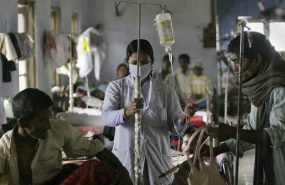Transition in the Balkans: are countries ready to sustain harm reduction programs?
- 12.12.2017 12:55
- Post Views: 826
At the same time, after a period of exponential growth in international aid for health, the economic crisis resulted in decrease of donors’ funding available for developing countries, including for HIV and TB programs, and in particular this is the case for the support available from the Global Fund.
Seeking to evaluate the processes and consequences of the transition from the Global Fund financing of HIV response among key affected populations with the sustainability of harm reduction services, a number of case studies were developed on some of Balkan countries (Albania, Bosnia and Herzegovina, Bulgaria, Macedonia, Romania and Montenegro).
The development of these case studies was guided by a Transition Readiness Assessment Tool (TRAT) developed to analyze the readiness and risks of transition from donor funding to sustainable domestic financing, identifying key barriers that must be addressed before sustainable transition is possible with a particular emphasis on assessing the sustainability of harm reduction services through and beyond the transition period.
Transition Readiness Assessment Tool (TRAT)
Transition Readiness Assessment Tool. User Manual
The Impact of Transition from Global Fund Support to Governmental Funding on the Sustainability of Harm Reduction Programs:
Case Study from Bosnia and Herzegovina
Source of the original content – Eurasian Harm Reduction Network
Related News
Global Fund Strategy Development – Open Consultation Questions
COVID-19 is radically altering global health, politics and economics, and the impact upon programs fighting HIV, TB and malaria will likely be tremendous. The new pandemic could completely derail our vast efforts of the past 20 years. At the same time, it has galvanized public awareness on global health security in a way that builds […] Read moreGlobal Fund Technical Brief Tuberculosis, Gender and Human Rights
The purpose of this technical brief is: to assist Global Fund applicants to consider how to include programs to remove human rights and gender-related barriers to tuberculosis prevention, diagnosis and treatment services within funding requests, and to help all stakeholders ensure that TB programs promote and protect human rights and gender equality. Post Views: 931 Read moreGlobal Fund Technical brief on HIV and key populations Programming at scale with sex workers, men who have sex with men, transgender people, people who inject drugs, and people in prison and other closed settings
The purpose of this technical brief is to provide information for countries preparing funding requests for comprehensive programs that address the cascade of HIV prevention, diagnosis, treatment, and care for the following key populations: male, female, and transgender sex workers, gay men and other men who have sex with men, transgender people (especially transgender women), […] Read moreServices for migrants and refugees from Ukraine – HIV/TB care with a focus on key populations
Due to the increasing flows of refugees from Ukraine because of Russia’s invasion of Ukraine, the EECA Regional Platform created a spreadsheet to fill contacts details of face-to-face and online services for refugees and migrants (with a focus on HIV/TB care and key population groups).
Regional Platform – EECA
This web-resource is a part of new regional communication and coordination project “Regional Civil Society and Community Support, Coordination and Communication Platform - EECA”, implemented by Eurasian Harm Reduction Association (EHRA).
Tags
See also
-
EECA’s Regional Platform monthly Newsletter #20, January 2026 27.01.2026 12:58
-
Global Fund Eligibility List 2026 27.01.2026 11:19







